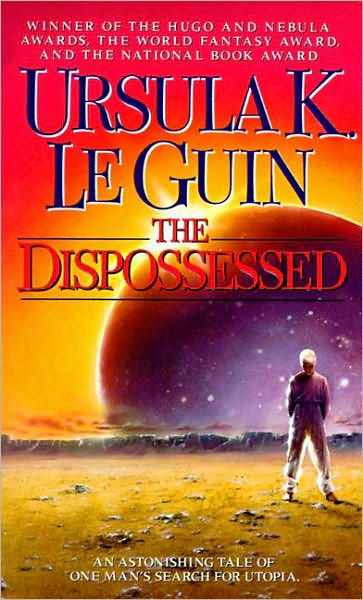I am about to embark on a bit of a series of sorts. Or, at least a generically linked set of posts revolving around utopian fiction—I feel this post is more overview than insight because I want to get the ball rolling, but if utopian fiction is supposed to do anything it is supposed to illuminate and challenge the limits of our imagination: So too, speculative fiction. I want to think about ways that utopian fiction inspires us to re-imagine our lives, if only for a moment. Furthermore, no other genre is as adept at mapping the world we live in by trying to imagine a world we would rather live in.
I want to begin with the book that was certainly the beginning for me. Bored by, and moving away from humor sci-fi and fantasy (Harry Harrison…well, certain Harry Harrison…or Piers Anthony for example) I decided I wanted to read something challenging, daring, adult. The sci-fi fantasy section in the used bookstore by my house was so daunting that I rushed passed the beginning (missing Asimov and Bradbury for instance) and blindly stumbling to Ursula Le Guin’s The Dispossessed.
I thought there were a bunch of cool things about this book from the get go: 1.) The binding was destroyed. It was a complete wreck. Someone had loved this book the way that I loved books: sleeping on them, throwing them at the walls when I was angry, writing marginalia in my dopey elementary school cursive, etc. 2.) It was only fifty cents. 3.) It was by a woman! Other than the Wrinkle in Time books I hadn’t read any science fiction by women before. 4.) It was by a woman who lived in my town! And finally 5.) Its title sounded like how I felt. The Dispossessed.
 This was the book for me. I tore through it with the kind of zeal Bastion displays in The Never Ending Story. Although thank god I never had to run to the window during a dreary Portland rain storm and yell BLAAAAAARRAAAAAAGHHHHHHAAAAHHHHHHGGHHHH to save the main character’s world, and, by extension, our imaginations, childhood, sense of goodness in the face of the brutal excess of the 1980s, etc. etc. At the very least it would save us from those raw egg health smoothies.
This was the book for me. I tore through it with the kind of zeal Bastion displays in The Never Ending Story. Although thank god I never had to run to the window during a dreary Portland rain storm and yell BLAAAAAARRAAAAAAGHHHHHHAAAAHHHHHHGGHHHH to save the main character’s world, and, by extension, our imaginations, childhood, sense of goodness in the face of the brutal excess of the 1980s, etc. etc. At the very least it would save us from those raw egg health smoothies.
 Though my copy wasn’t the first edition, the first edition does sport a pretty terrible hat. He’s an anarchist from the moon Anarres, not the Count of Monte Cristo.
Though my copy wasn’t the first edition, the first edition does sport a pretty terrible hat. He’s an anarchist from the moon Anarres, not the Count of Monte Cristo.
Ambivalence holds a certain charm; ambiguity instead of moral clarity is comforting. I mean does anyone really want to get saved from the tenacious and highly sexy grasp of the brides of Dracula? No! This might be the central yet seemingly tangential reason Ursula Le Guin’s The Dispossessed utterly enchants me still.
The universe of The Dispossessed is split into a series of worlds. The main character Shevek has grown up on the nearly desolate anarchist moon Anarres orbiting the planet Urras divided between a capitalist government and a socialist one. Yes, the metaphors are heavy handed, but as the story progresses we see the breakdown between the reified and hardline positions readers—not used to dealing in nuance—both expect, and as such, find in the text.
 But in reality, Shevek is trapped between his actual anarchist beliefs—his desire to experiment with physics—and the oily and Dickensianly grotesque head of the physics guild, Sabul. Everything Sabul touches is befouled—each page is slimed. After every moment of their interaction I can only imagine Shevek declaring that he, a la Peter Venkman, “feels so funky.” In fact, each painful scene of the head physicist denying Shevek’s brilliance reminds me of the eviction of Peter, Egon, and Ray from Columbia University.
But in reality, Shevek is trapped between his actual anarchist beliefs—his desire to experiment with physics—and the oily and Dickensianly grotesque head of the physics guild, Sabul. Everything Sabul touches is befouled—each page is slimed. After every moment of their interaction I can only imagine Shevek declaring that he, a la Peter Venkman, “feels so funky.” In fact, each painful scene of the head physicist denying Shevek’s brilliance reminds me of the eviction of Peter, Egon, and Ray from Columbia University.
Le Guin juxtaposes two different historical narratives: one, a bildungsroman where we learn Shevek has always thought outside of the officially accepted (and oxymoronic) anarchist terms; and the other narrative where Shevek travels to the enemy planet to practice physics and expose himself to the difficulties and dangers of a capitalist system. As a child this was my favorite part; watching Shevek’s discomfort at how to deal with servants. As an adult however, the dissonance between social mores creates one of the most cringingly uncomfortable sex scenes I’ve ever read.
Yet, when reading customer reviews of the book (not really a trusted source for much), people seem to think Shevek’s anarchic moon of Anarres is somehow a good place. It’s not. It has been overrun by bureaucrats who have tarnished the idea of what anarchism might be like while simultaneously declaring the impossibility of bureaucracy. On paper everyone is free to do whatever he or she wants, but in reality small groups have banded together and collected what little power or influence they can and are just as competitive as the dirty propertarians. (The foulest slang word in the text). The wonder of this book is that no one is right. Shevek can’t live up to his ideals; each world either wants to bury him, exploit him, or both; and in the end there is very little that a reader looking for a blue print about socio-political action can hold on to. We see the decadence and brutal class divisions of Urras, but we also see how in this society Shevek is actually appreciated (albeit only for his ability to make Urras more competitive).
When I first read this book I blazed through it happy to read about the seeming anarchic world so at odds with the rigid hierarchy of grade school. What if I didn’t want to play tetherball? Seemingly, according to The Dispossessed I didn’t have to. But actually taking the book fully into account now it’s painfully obvious that I’d probably still have to play tetherball.
Sean Grattan is a voracious consumer of fiction and a deadly big buck hunter.










